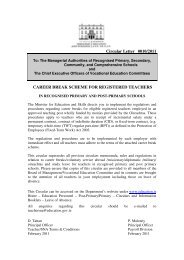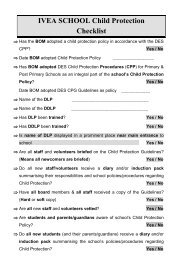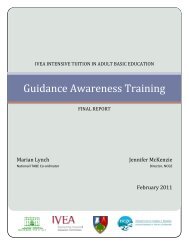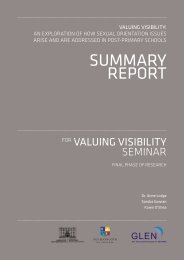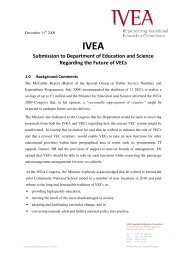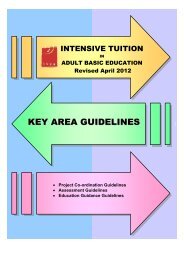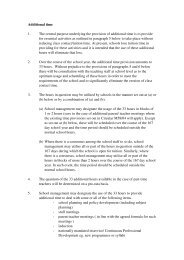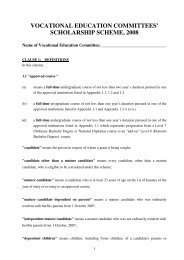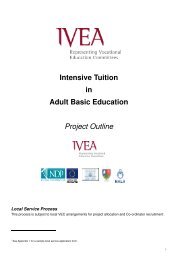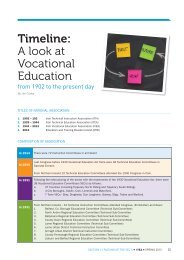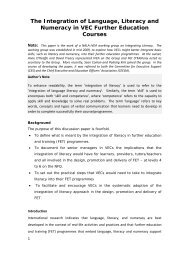APPENDIX INATIONAL STRUCTURESThe following section adapted from <strong>IVEA</strong>’s 2001 policy publication entitled:<strong>IVEA</strong> Policy on Educational Provision for Asylum Seekers, Refugees andother Non-nationals.Over-arching Co-ordinating StructureThere is a wide range of agencies, both statutory and voluntary, involved inthe provision of services to asylum seekers, refugees and minority linguisticgroups. Because the situation in this area developed so rapidly and tosuch an extent over the last number of years, it appears that services wereintroduced on an ad hoc basis in order to deal with the issue.In order to bring greater efficiency to existing services it is vital that a nationalco-ordinating body be established comprising all agencies, both statutory andvoluntary, with a brief to ensure that services are delivered in the most efficientway possible and to eliminate overlapping of services.The many agencies working in this area include: Local Authorities, RegionalAuthorities, Health Boards, various Government Departments, FÁS, VECs,primary and secondary schools etc., as well as a large number of voluntarybodies, drawn from all sections of society. Much of their work is done quietlyand efficiently. To all of them the introduction of a co-ordination service wouldbe of tremendous help in delivering a more efficient and improved service.The <strong>IVEA</strong> recommend that the co-ordinating body be operated at threelevels: national, local and community:• A National Co-ordinating Committee should be established with thepurpose of linking all relevant national agencies in both the co-ordinationof services and the formulation of policy. The <strong>IVEA</strong> therefore calls onthe Government to set up a National Co-ordinating Committeewhich would incorporate all the relevant Government departmentsand state agencies.• At local (regional or county) level, Local Co-ordinating Committeeswhich include representatives from a wide range of relevant and interestedstatutory, voluntary and community organisations should be established toco-ordinate formulation of policy and delivery of services at local level and tofeed into the National Co-ordinating Committee.• Community Support Groups aimed at co-ordinating services atcommunity level and providing practical support and information toindividuals would be of benefit to the asylum seeker/refugee communitiesand also to host communities. These support groups could link back tothe Local Co-ordinating Committees.51The full text of the Acts listed is available on the following website www.irishstatuebook.ieAPPENDIX IIAnnex II details the most relevant sections of the various pieces of legislation 51applicable in the context of educational provision for asylum seekers, refugeesand other minority linguistic groups in the Further Education sector.Extract from: The Education Act, 1998Objects of Act.6.— Every person concerned in the implementation of this Act shall haveregard to the following objects in pursuance of which the Oireachtas hasenacted this Act:(a) to give practical effect to the constitutional rights of children, includingchildren who have a disability or who have other special educationalneeds, as they relate to education;(b) to provide that, as far as is practicable and having regard to the resourcesavailable, there is made available to people resident in the State a level andquality of education appropriate to meeting the needs and abilities of thosepeople;(c) to promote equality of access to and participation in education and topromote the means whereby students may benefit from education;(d) to promote opportunities for adults, in particular adults who as childrendid not avail of or benefit from education in schools, to avail of educationalopportunities through adult and continuing education;(e) to promote the right of parents to send their children to a school of theparents’ choice having regard to the rights of patrons and the effective andefficient use of resources;(f) to promote best practice in teaching methods with regard to the diverseneeds of students and the development of the skills and competences ofteachers;(g) to promote effective liaison and consultation between schools and centresfor education, patrons, teachers, parents, the communities served byschools, local authorities, health boards, persons or groups of persons whohave a special interest in, or experience of, the education of students withspecial educational needs and the Minister;(h) to contribute to the realisation of national educational policies andobjectives;(i) to contribute to the realisation of national policy and objectives in relation tothe extension of bi-lingualism in Irish society and in particular theachievement of a greater use of the Irish language at school and in thecommunity;(j) to contribute to the maintenance of Irish as the primary communitylanguage in Gaeltacht areas;(k) to promote the language and cultural needs of students having regard tothe choices of their parents;(l) to enhance the accountability of the education system, and(m)to enhance transparency in the making of decisions in the educationsystem both locally and nationally.Functions of a school.9.—A recognised school shall provide education to students which isappropriate to their abilities and needs and, without prejudice to the generalityof the foregoing, it shall use its available resources to—(a) ensure that the educational needs of all students, including those with a39
disability or other special educational needs, are identified and provided for,(b) ensure that the education provided by it meets the requirements ofeducation policy as determined from time to time by the Minister includingrequirements as to the provision of a curriculum as prescribed by theMinister in accordance with section 30,(c) ensure that students have access to appropriate guidance to assist them intheir educational and career choices,(d) promote the moral, spiritual, social and personal development of studentsand provide health education for them, in consultation with their parents,having regard to the characteristic spirit of the school,(e) promote equality of opportunity for both male and female students andstaff of the school,(f) promote the development of the Irish language and traditions, Irishliterature, the arts and other cultural matters,(g) ensure that parents of a student, or in the case of a student who hasreached the age of 18 years, the student, have access in the prescribedmanner to records kept by that school relating to the progress of thatstudent in his or her education,(h) in the case of schools located in a Gaeltacht area, contribute to themaintenance of Irish as the primary community language,(i) conduct its activities in compliance with any regulations made from time totime by the Minister under section 33,(j) ensure that the needs of personnel involved in management functions andstaff development needs generally in the school are identified and provided for,(k) establish and maintain systems whereby the efficiency and effectivenessof its operations can be assessed, including the quality and effectivenessof teaching in the school and the attainment levels and academic standardsof students,(l) establish or maintain contacts with other schools and at other appropriatelevels throughout the community served by the school, and(m) subject to this Act and in particular section 15 (2) (d), establish andmaintain an admissions policy which provides for maximum accessibility tothe school.Functions of a board.15.—(1) It shall be the duty of a board to manage the school on behalf of thepatron and for the benefit of the students and their parents and to provide orcause to be provided an appropriate education for each student at the schoolfor which that board has responsibility.(2) A board shall perform the functions conferred on it and on a school by thisAct and in carrying out its functions the board shall—(d) publish, in such manner as the board with the agreement of the patronconsiders appropriate, the policy of the school concerning admission toand participation in the school, including the policy of the school relating tothe expulsion and suspension of students and admission to and participationby students with disabilities or who have other special educational needs,and ensure that as regards that policy principles of equality and the right ofparents to send their children to a school of the parents’ choice arerespected and such directions as may be made from time to time by theMinister, having regard to the characteristic spirit of the school and theconstitutional rights of all persons concerned, are complied with,(e) have regard to the principles and requirements of a democratic societyand have respect and promote respect for the diversity of values, beliefs,traditions, languages and ways of life in society,(g) use the resources provided to the school from monies providedby the Oireachtas to make reasonable provision and accommodation forstudents with a disability or other special educational needs, including, wherenecessary, alteration of buildings and provision of appropriate equipment.Functions of Principal and teachers.22.(1) The Principal of a recognised school and the teachers in a recognisedschool, under the direction of the Principal, shall have responsibility, inaccordance with this Act, for the instruction provided to studentsin the school and shall contribute, generally, to the education and personaldevelopment of students in that school.(2) Without prejudice to subsection (1), the Principal and teachers shall—(c) collectively promote co-operation between the school and thecommunity which it serves…Extract from: The Equal Status Act, 2000Discrimination (general)3.—(1) For the purposes of this Act, discrimination shall be taken tooccur where—(a) on any of the grounds specified in subsection (2) (in this Act referred toas “the discriminatory grounds”) which exists at present or previouslyexisted but no longer exists or may exist in the future, or which is imputedto the person concerned, a person is treated less favourably than anotherperson is, has been or would be treated,(b) (i) a person who is associated with another person is treated, by virtueof that association, less favourably than a person who is not so associatedis, has been or would be treated, and(ii) similar treatment of that person on any of the discriminatory groundswould, by virtue of paragraph (a), constitute discrimination, or(c) (i) a person is in a category of persons who share a commoncharacteristic by reason of which discrimination may, by virtue of paragraph(a), occur in respect of those persons,(ii) the person is obliged by the provider of a service (within the meaningof section 4(6)) to comply with a condition (whether in the nature of arequirement, practice or otherwise) but is unable to do so,(iii) substantially more people outside the category than within it are able tocomply with the condition, and(iv) the obligation to comply with the condition cannot be justified as beingreasonable in all the circumstances of the case.(2) As between any two persons, the discriminatory grounds (and thedescriptions of those grounds for the purposes of this Act) are:(a) that one is male and the other is female (the “gender ground”),(b) that they are of different marital status (the “marital status ground”),(c) that one has family status and the other does not or that one has adifferent family status from the other (the “family status ground”),(d) that they are of different sexual orientation (the “sexual orientation ground”),(e) that one has a different religious belief from the other, or that one has areligious belief and the other has not (the “religion ground”),(f) subject to subsection (3), that they are of different ages (the “age ground”),(g) that one is a person with a disability and the other either is not or is aperson with a different disability (the “disability ground”),(h) that they are of different race, colour, nationality or ethnic or nationalorigins (the “ground of race”),40



